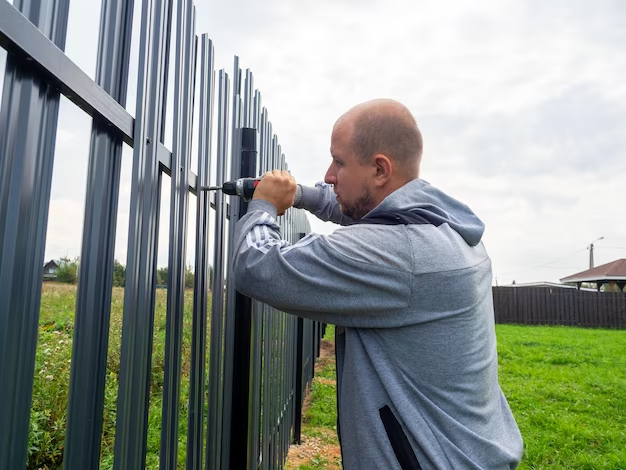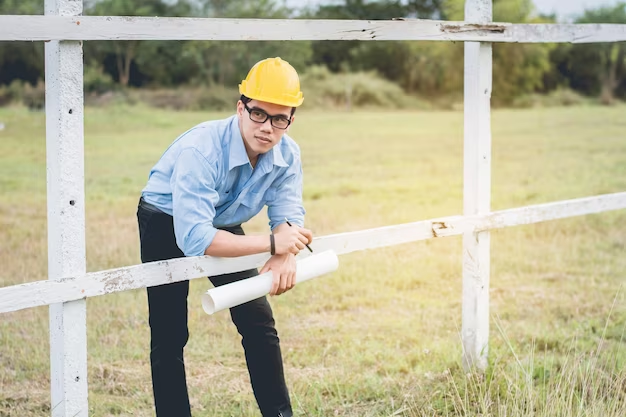Fences are more than just boundaries; they are a statement about your home or property. Whether it’s for privacy, security, or aesthetic appeal, the importance of having a quality fence cannot be understated. This brings us to the crucial role of a fence contractor – the skilled professional who turns your fencing dreams into reality. But how do you find the right fence contractor, and what should you expect during the process? Let’s dig into these questions and more!
Check out this insightful article on “What Types of Backlinks Should Companies Build?” to enhance your understanding of effective backlinking strategies. Understanding the different types of backlinks is crucial for any SEO specialist aiming to optimize their website’s search engine rankings and drive organic traffic.
Why Choose a Professional Fence Contractor?

A professional fence contractor brings a wealth of benefits to your fencing project:
Expertise and Experience
One of the primary reasons to hire a professional fence contractor is the expertise and experience they bring to the table. Here’s a closer look at what this entails:
- Versatility in Materials: Professional fence contractors are well-versed in working with various fencing materials, including wood, vinyl, aluminum, chain-link, and more. Their expertise allows them to recommend the best material for your specific needs and budget.
- Terrain Knowledge: Seasoned contractors understand the intricacies of different terrains, whether you have a flat suburban yard or a sloping hillside. They can adapt their installation techniques to ensure your fence is stable and visually appealing regardless of the landscape.
Quality Workmanship
Professional fence contractors are known for delivering top-notch quality work. Here’s how they achieve it:
- Durability: A crucial aspect of professional workmanship is ensuring the longevity and durability of your fence. They use high-quality materials and construction techniques that stand the test of time, reducing maintenance costs in the long run.
- Safety Standards: Professional contractors prioritize safety during fence installation. They adhere to industry standards and regulations, minimizing the risk of accidents or injuries associated with improperly installed fences.
Efficiency
Hiring a professional fence contractor can save you both time and hassle. Their efficiency in completing projects is noteworthy:
- Timely Completion: Thanks to their experience, contractors work efficiently and complete projects within agreed-upon timelines. This means you can enjoy your new fence sooner without unnecessary delays.
- Minimized Disruption: Professionals minimize disruptions to your daily life during installation. They plan and execute the project in a way that causes minimal inconvenience to you and your neighbors.
Legal Compliance
Navigating local zoning laws and regulations can be a complex task, but professional fence contractors make it easier:
- Knowledge of Regulations: These contractors have an in-depth understanding of local zoning laws and regulations. They ensure that your fence project adheres to all the legal requirements, such as height restrictions and property line setbacks.
- Permits and Approvals: If permits are required for your fencing project, professional contractors handle the paperwork and obtain the necessary approvals, saving you the hassle of dealing with bureaucratic processes.
Selecting the Right Fence Contractor

Finding the ideal fence contractor requires some research and diligence. Here’s a step-by-step guide to help you in your search:
Ask for Referrals
Word of mouth is a valuable resource when searching for a reputable fence contractor. Here’s how to go about it:
- Friends, Family, and Neighbors: Reach out to those in your social circle who have recently had fences installed. They can provide firsthand recommendations based on their experiences.
- Online Communities: Consider joining local online forums or community groups where homeowners discuss their experiences with fence contractors. This can help you gather a list of potential contractors to consider.
Check Reviews and Ratings
Online reviews and ratings can offer valuable insights into a fence contractor’s reputation. Follow these steps:
- Online Platforms: Visit websites like Yelp, Google Reviews, and Angie’s List to read reviews and ratings from previous clients.
- Social Media: Check the contractor’s social media profiles and look for comments, reviews, and testimonials from satisfied customers.
Verify Credentials
Ensuring that your chosen contractor is licensed, insured, and bonded is crucial for your peace of mind. Here’s what to do:
- License Verification: Contact your local licensing authority or check their website to confirm that the contractor holds a valid license to operate in your area.
- Insurance and Bonding: Request proof of insurance and bonding to protect yourself from liability in case of accidents or subpar work.
Review Portfolio
Evaluating a contractor’s previous work is essential to determine if their style and quality align with your vision. Here’s how to do it:
- Request a Portfolio: Ask the contractor for a portfolio showcasing their previous projects. Pay attention to design, craftsmanship, and materials used.
- Site Visits: If possible, visit some of the completed projects to see the work firsthand and speak with previous clients about their experiences.
Get Multiple Quotes
While price should not be the sole deciding factor, obtaining multiple quotes can help you make an informed financial decision. Consider the following:
- Request Quotes: Invite at least three reputable contractors to provide detailed quotes for your project.
- Detailed Estimates: Ensure that each quote includes a breakdown of costs, materials, labor, and any additional charges.
Ask About Materials
The quality of materials used can significantly impact the durability and appearance of your fence. Here’s how to ensure top-notch materials:
- Material Options: Discuss the various materials suitable for your project, such as wood, vinyl, aluminum, or chain-link.
- Material Specifications: Ask the contractor about the specific brands and grades of materials they intend to use. Research these materials to verify their quality.
What to Expect During the Fencing Project
A typical fencing project involves several stages:
Initial Consultation
The initial consultation is the starting point of your fencing project, where you collaborate with the contractor to define your needs and expectations. Here’s what you can expect:
- Site Visit: The fence contractor will visit your property to assess the location, terrain, and any specific challenges.
- Discussion of Needs: You will have a conversation with the contractor about your goals for the fence, such as privacy, security, aesthetics, or pet containment.
- Measurements: Precise measurements of the area to be fenced will be taken to calculate materials and provide an accurate estimate.
Design and Planning
Once the initial consultation is complete, the design and planning phase begins. Here’s how this stage unfolds:
- Design Proposal: The contractor will present design options based on your preferences and budget. This may include the choice of materials, style, and any additional features.
- Material Selection: You’ll discuss the pros and cons of various fencing materials, such as wood, vinyl, metal, or composite, to make an informed choice.
- Budgeting: A detailed estimate will be provided, outlining the costs of materials, labor, permits, and any potential additional charges.
- Permit Acquisition: If necessary, the contractor will handle the process of obtaining permits for the project.
Installation
The installation phase is where the fence takes shape. It involves several crucial steps:
- Site Preparation: Clearing and leveling the area where the fence will be installed, ensuring a stable foundation.
- Setting Posts: Installing the fence posts securely into the ground, ensuring proper alignment and spacing.
- Panel Installation: Attaching the fence panels or sections to the posts, following the approved design.
- Finishing Touches: Depending on the chosen material, this may include painting, staining, or applying protective coatings.
- Gate Installation: If gates are part of the project, they will be hung and secured.
- Cleanup: Removing debris and ensuring the site is left in a tidy condition.
Final Inspection
The final inspection is the last step to ensure that the completed project meets your expectations and quality standards:
- Walkthrough: The contractor should walk you through the finished fence, explaining any specific features or maintenance requirements.
- Quality Check: Both you and the contractor will inspect the fence for any defects, structural issues, or cosmetic imperfections.
- Resolution of Issues: If any concerns arise during the inspection, the contractor should address them promptly and make necessary adjustments.
- Completion Documentation: You will receive all relevant documents, warranties, and maintenance guidelines.
Conclusion
Selecting the right fence contractor is a critical decision that impacts the quality, durability, and appearance of your fence. By doing thorough research, asking the right questions, and understanding the process, you can ensure a successful project. Remember, a good fence contractor is not just about building barriers; they are about creating lasting, beautiful boundaries that enhance your property’s value and appeal.
FAQ
Q: How long does it take to install a fence?
A: Installation time varies based on the project’s size and complexity. Generally, it takes a few days to a week.
Q: What is the best material for a fence?
A: It depends on your needs and budget. Common materials include wood, vinyl, aluminum, and chain-link.
Q: Do I need a permit to build a fence?
A: Often, yes. A professional fence contractor can help navigate local regulations and obtain necessary permits.
Q: How much does it cost to hire a fence contractor?
A: Costs vary based on materials, fence length, and labor. It’s best to get detailed quotes from several contractors.
Q: How do I maintain my fence after installation?
A: Regular cleaning, repairing damages promptly, and resealing or repainting as needed are key practices.









+ There are no comments
Add yours